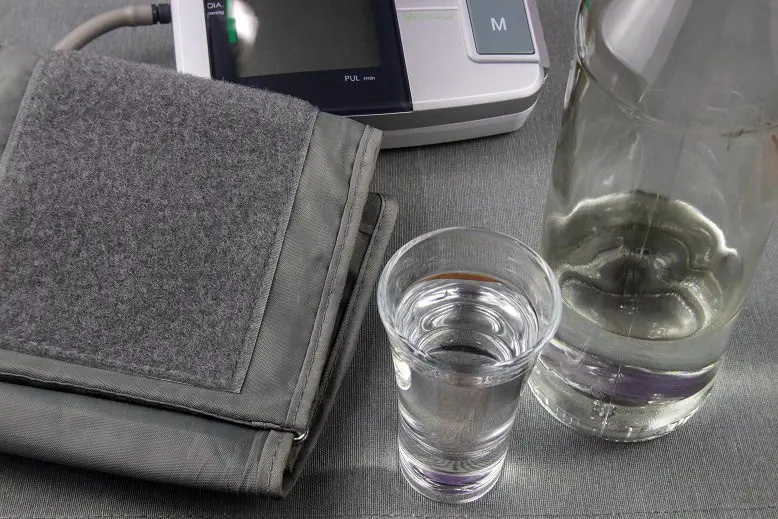Contents
According to statistics, about a third of the Russian population suffers from hypertension of varying degrees. Alcohol abuse, without a doubt, harms the cardiovascular system. In small doses, alcohol serves as a means of preventing coronary disease. Vodka can both lower and increase blood pressure. It all depends on how much you use it.
The mechanism of the influence of alcohol on pressure
The main component of vodka is ethyl alcohol, which is able to be absorbed into the blood through the mucous membranes of the oral cavity. Ethanol penetrates the nerve fibers and blocks the release of neurotransmitters – substances that are responsible for the transmission of impulses that maintain vascular tone. As a result, partial paralysis of the vascular walls occurs, which increases blood flow and helps to reduce pressure.
That is why a person who has taken a small dose of alcohol feels a pleasant relaxation throughout the body. But this effect does not last long. With further entry of ethanol into the blood, the body reflexively increases the production of neurotransmitters. Vascular tone is restored to its original state. With each new dose of alcohol, the effect is repeated, as a result, the body cannot cope with the load, and the pressure rises.
Ethanol has an exciting effect on the nervous system and stimulates the production of norepinephrine, causing an increase in heart rate and leading to impaired kidney function. Constant stress adversely affects the condition of the heart muscle and increases the risk of developing coronary disease. Frequent stress on the vessels leads to wear of their walls and fragility. In large quantities, vodka increases blood pressure to critical levels and can cause a heart attack.

Vodka at reduced pressure
Each person has his own pressure indicators at which he feels normal. Numbers below 100/60 are the reason for the diagnosis of hypotension. The disease is primary or chronic and is characterized by increased fatigue, headaches and apathy. According to popular belief, alcohol can help normalize blood pressure due to its tonic effect.
Doctors in this case adhere to a completely opposite point of view. Vodka lowers blood pressure by relaxing the walls of blood vessels and increasing blood flow. Alcohol can cause a sharp exacerbation of the disease, which is fraught with a hypotensive crisis.
A person may feel sudden weakness, dizziness, and even lose consciousness, so patients with serious pathologies should use any alcohol with caution. Vodka and cognac are considered the safest in the initial stages of the disease.
High pressure vodka
When answering the question whether it is possible to drink vodka with hypertension, the opinions of doctors differ. A number of experts believe that small doses of good alcohol, due to their vasodilating effect, can normalize high blood pressure in hypertensive patients. This is especially true for people with minor deviations from the norm caused by a neurogenic nature. A safe dose does not exceed 25 ml of vodka at a time.
Chronic hypertension is a persistent increase in blood pressure greater than 140/90. Abundant libations in this case can lead to unpredictable consequences. It is believed that a one-time feast with moderate consumption of a small amount of vodka will not cause serious harm to health.
For men, the allowed amount is 90 grams, for women, the figure is reduced to 60 grams. At the same time, people who constantly take medication to reduce pressure, alcohol is contraindicated in principle.
What to do if the pressure rises after vodka
It must be remembered that ethanol and antihypertensive drugs together can cause a critical drop in pressure, up to coma and collapse. Alcohol enhances all the side effects listed in the drug annotations: nausea, incoordination, chills and weakness. To avoid unpleasant consequences, you must carefully read the instructions for the drugs.
If your blood pressure has increased after drinking alcohol, doctors recommend:
- take magnesium (magnesium sulfate);
- provide access to fresh air in the room;
- lie down, relax and even out breathing;
- if the limit values increase by more than 20%, call an ambulance.
Magnesia is a relatively safe drug that is sold in powder form or in ampoules. The contents of one serving should be diluted in a glass of water and taken in three doses in an amount of not more than a tenth of the resulting solution. If the pressure jumped for the first time, you should seek help from a specialist. Self-medication can be hazardous to health!









